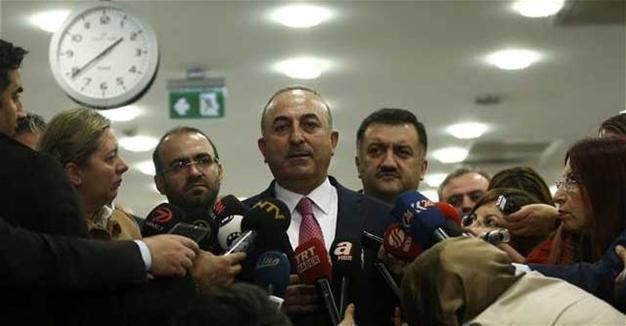Turkey blames German ‘deep state’ in fresh row
ANKARA
 Tension between Turkey and Germany continues to rise, as fresh statements come from Ankara and Berlin, with Foreign Minister Çavuşoğlu saying that the cancelation of meetings are ‘inexplicable’
Tension between Turkey and Germany continues to rise, as fresh statements come from Ankara and Berlin, with Foreign Minister Çavuşoğlu saying that the cancelation of meetings are ‘inexplicable’‘This move of Germany denounces democracy, the right to assembly and freedom of expression,’ Çavuşoğlu says.
Çavuşoğlu and his German counterpart, Sigmar Gabriel, spoke on the phone on the latter’s demand.
Germany, home to nearly three million Turkish citizens, is often visited by Turkish politicians ahead of key polls. Votes cast abroad have a significant impact on election results, as the overseas electorate makes up around 5 percent of Turkey’s entire electorate.
Germany also barred President Recep Tayyip Erdoğan from holding a planned rally with Germany-based Turkish citizens last year, after the failed July 2016 military coup attempt.
“This is a systematic move of the German deep state. This move of Germany denounces democracy, the right to assembly and freedom of expression,” Çavuşoğlu told reporters on March 3, describing the cancelation of Bozdağ’s meeting as an “example of Germany and the Western world’s double-standards on democratic implementations.”
He also noted that Germany did not allow President Erdoğan to meet with Turks in Germany in the aftermath of the July 2016 coup attempt while “allowing the [outlawed Kurdistan Workers’ Party] PKK to hold a meeting.”
‘Not Turkey’s boss’
“You permit leaders of terror organizations but you don’t allow Turkey’s democratically elected President Recep Tayyip Erdoğan. This is inexplicable,” Çavuşoğlu said. “You have to see Turkey as an equal partner. Turkey is not a country under your order. You are not Turkey’s boss. You are not a first class and Turkey is not a second class country. We don’t treat you like this. You have to treat Turkey like an equal partner,” he added.
Justice Minister Bozdağ, meanwhile, also lashed out at the German authorities on March 3, claiming that Germany has become a “haven for terrorist organizations” like the PKK, the Fethullahist Terror Organization (FETÖ) and the Revolutionary People’s Liberation Party-Front (DHKP-C).
“Turkey’s justice system is more independent than the justice system in Germany,” Bozdağ said.
EU Minister Ömer Çelik also criticized the cancellation of the meeting via his Twitter account on March 3.
“We share common values with Germany such as democracy, the rule of law, and fundamental rights and freedoms. We expect respect to these values. Preventing meetings with our citizens in Germany is a clear obstruction of the use of a democratic right,” Çelik said.
“Those who erect new ideological and mental Berlin Walls give the greatest damage to European democracies.
If democratic gatherings are prevented then geographical and political barbed wires are constructed against democracy. Anti-immigrant, anti-Semitic, racist and Islamophobic political movements are also against the values of the EU. Actions tantamount to the demands of such movements to prevent our gatherings with our citizens only put European democracies in the wrong hands. A country that prevents us from meeting our citizens should understand that the consequences of these actions would be the weakening of democratic values,” he added.
A spokesman for the German foreign ministry, meanwhile, said that the German federal government was not involved in the banning of the event.
“It was a decision that the German federal government did not influence in any way, and could not have influenced, because it is a matter of state and local law over which we have zero influence,” spokesman Martin Schaefer told a regular government news conference.
He said German ambassador Martin Erdmann underscored that message during a “serious but friendly” discussion with Turkish authorities after being summoned to discuss the incident late on Feb. 28.
During his speech, Schaefer said “the common ways of both countries should be put forward.”
“Our call on everybody who wants to have good and developing relations between our countries is to not pour oil on fire. Instead, we should put forward common sides,” he added.
Schaefer said Germany would do everything it could to maintain an open dialogue with Turkey despite tensions over a range of issues, including Ankara’s arrest of a German-Turkish journalist.
“The referendum is a domestic issue for Turkey,” Ulrike Demmer, a spokeswoman for Merkel, said, adding: “Freedom of opinion ... should be respected” both in Turkey and in Germany.
















